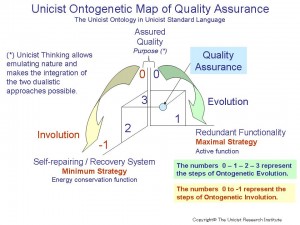The Quality Assurance System defines one’s Reliability
Quality assurance is the difference that makes a person, institution, work group, system, work or product reliable or not.
 Without quality assurance there is no reliability in results within reality. The more objective the subject is, the less complex the application of the quality assurance concept becomes. The more abstract, intangible or subjective the result, the more complex this concept management is.
Without quality assurance there is no reliability in results within reality. The more objective the subject is, the less complex the application of the quality assurance concept becomes. The more abstract, intangible or subjective the result, the more complex this concept management is.
As a final summary of the Quality Assurance process find listed below a synoptic description of elements which includes the Quality Assurance Functional Concept.
The taxonomy is the descriptive one according to order of presentation. However, it implies having a clear understanding of the concept seen as a unit given that the unified field it encompasses may only be apprehended as of this totalizing/integral idea.
Elements included in a Quality Assurance System:
- Plan “B”
- Redundant Systems
- Alarm System
- Processes with redundancies
- Stop System (stoppage/halt)
- Control System
- Self repairing/recovery System
- Alternative Systems
The quality assurance concept is very hard to apprehend and internalize. In order to do so it is necessary to see the elements described above within oneself. It is only as of this that a quality assurance process can be developed.
Diego Belohlavek
NOTE: The Unicist Research Institute was the pioneer in complexity science research and became a private global decentralized world-class research organization in the field of human adaptive systems. http://www.unicist.org
